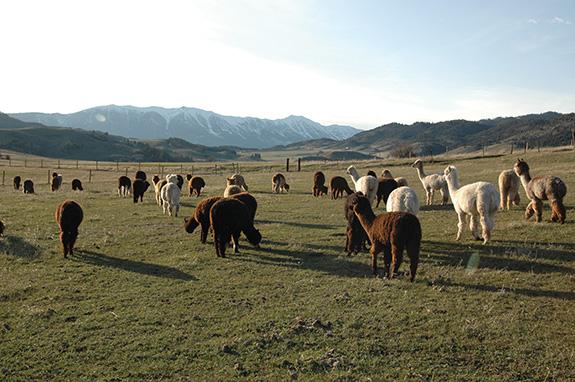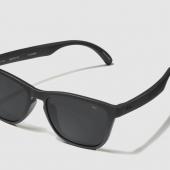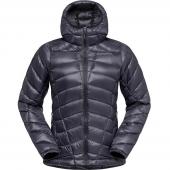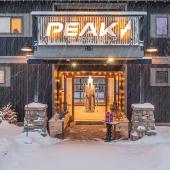Gallatin Gold
Alpaca fleece finds a Bozeman niche.
“I can almost guarantee you will not be spit on today,” Sarah assures me. She and her husband James, the founders of Alpacas of Montana, lead me through open pasture, weaving through a sea of long necks and bushy heads. James addresses each alpaca by name. “Hey Cadillac… Come here, Prince Philip.” The exchange is one of mutual respect: the animals kindly restrain their saliva because here, they are appreciated. Their fleece, the “Gold of the Andes,” forms the backbone of Sarah and James’s Bozeman-bred business.
The quality of alpaca fiber speaks for itself—so much so that Sarah and James, with backgrounds in the manufacturing and medical fields respectively, abandoned their old jobs ten years ago and made a pilgrimage to Peru, resolving to learn everything about alpacas to start their business. The result: an alpaca farm in Bozeman that sells its products all over the country.
Sarah singles out a young male named Dante from the herd. She and James purchased him from California for breeding, she explains, and when I reach out to pet him, I see why. Alpaca fibers are measured in units of microns (one millionth of a meter) where the finest fiber produces the softest fabric. Human hair is usually between 100 and 120 microns wide; Dante’s fibers are less than 18 microns wide, known as Royal Alpaca quality. They feel luxurious.

We leave the pasture and go back to the farmhouse, sitting down at a dining-room table covered in hats, gloves, scarves, and accessories. “It’s not like you just shear them and say, ‘Okay, I want to make socks,’” James explains, extending a pair of purple-striped dress socks. “This is a specific type of fiber that we look for, and that we purchase for those specific socks.” (Demand for Alpacas of Montana apparel is high—and alpaca fibers only grow enough to shear once per year—so Sarah and James purchase fleece from a larger supplier, too.)
Recalling their trip to South America, James explains that Peru is the world's leading exporter of alpaca fiber, but here in America, sheep wool rules the market. “Alpaca fiber has little to no barbs on it, so it doesn’t scratch you,” James explains. “Because of that, we don’t have to do what sheep people do, which is called superwash; they put acetone on it to burn those barbs off.” The process behind alpaca-fiber softness occurs naturally, without chemical treatment, so it’s friendlier to you and the environment.

James leans forward; his excitement is still mounting. Alpaca fibers are also hollow, giving them efficient wicking properties, and James harnesses this particular feature for outdoor performance in Montana. “I have a hunting-slash-fishing sock that’s super thick that I wear even in the summertime in my fishing waders,” he says. “When I take my waders off, the outside layer may have a dew layer on it, but I take off my socks and my feet are dry.” James hands me an Extreme Warmth Windstopper Hat while he’s on the subject. “Because I’m a hardcore fisherman, I made the brim just long enough to help with the sun,” he explains, “but not long enough to hit your scope if you’re a hunter.”
Sarah nods agreement, and adds that one of the most positive indicators from the Bozeman community has been their annual open house. “Every once in a while, I get a heart-stopping moment at our open house. We had 4,700 people here last year,” Sarah says. Every year, cars line the road to learn about the animals and browse the Alpacas of Montana products. “They’re the ones that built Alpacas of Montana,” James confirms.

Behind the scenes, you might find Sarah bottle-feeding baby alpacas at 2am or James shoveling crap on a hot summer day, not the vision they always planned. “I went from surgery and sterile environments to scooping poop,” says James. “But you want to know the truth of it? I love scooping poop. We compost it and we make a whole shitload of money off their poop.” So, as long as there’s crap to scoop, the folks at Alpacas of Montana will be innovating the fabric world with a smile; looks like Bozeman’s supply of alpaca products is safe for a while.













